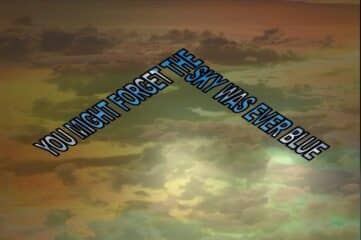
In 2016 Cease, Cows published “Suicide Island” by Mike Chin, a harrowing tale of reality TV. Readers looking for more of Chin’s work should check out his new collection, You Might Forget the Sky Was Ever Blue, available in September from Duck Lake Books. A smart, witty collection of stories featuring characters up against the challenges and pressures of the current social climate, You Might Forget the Sky Was Ever Blue highlights Chin’s spot-on dialogue, sharp imagination, and perceptive eye. Order your copy today!
Chin shared his thoughts with Cease, Cows in a recent interview.
Chuck Augello: The opening story, “Prophecy,” is fraught with anxiety and an atmosphere of social conflict. The main character is a 3rd grade teacher in Baltimore. How is his life affected by the pressures of the moment?
Mike Chin: “Prophecy” was, in many ways, my attempt to capture what it was like to be an American from around 2014 to 2016, balancing the chronic tension of a national—if not global—world that’s going bonkers at the same time that relationship dynamics and the weight of being an educator are offering more acute stresses. I first drafted this story in late 2015, and one of my fears was that it might not resonate too far outside its moment. I think that the variety of ways in which social media and different social pressures continue to weigh on so many of our lives has kept the story relevant, though. Even if the election itself, and some of the other more pressing then-current events have passed, there’s no shortage of analogous macro-level stressors to take their place.
CA: Several of the stories are set in Shermantown, New York, a rural community near the Canadian border. What made you want to write about this location?
MC: I grew up in Utica, New York which is nowhere near as rural as the fictional Shermantown, but I was raised by two parents from New York City to whom Utica felt as small town as it gets. So, Shermantown combines elements of my hometown with what I gathered about other Upstate New York communities for an amalgam that’s at once rooted in my experience and largely invented based on an increasingly high volume of stories I’ve set there.
CA: Tell us about Cal, the high school student at the center of the title story, “You Might Forget the Sky was Ever Blue.” He’s dealing with some strong emotions after an encounter with a peer.
MC: Cal is the protagonist and narrator for three stories in the collection. “The End of the World” and “You Might Forget the Sky was Ever Blue” are in many ways two halves of the same story. The traumatic experience he undergoes in the former story ultimately felt as though it needed to be its own piece; the latter story was largely inspired by the years I spent in management for an academic summer program, and myriad messy situations I waded through from the uncomfortable position of an adult who typically wasn’t there when inciting incidents happened, and often had to mind the middle ground between children, adults working more directly with them, my own supervisors, and the attorneys advising us. To get back to your question more literally, Cal starts out a closeted gay teen, and gets pushed to the brink when the trauma he undergoes not only scars him, but simultaneously fouls up a budding relationship and forces him to come out to not only his father, but school administrators he barely knows. The final story he appears in, “Otters,” flashes well forward into his adult life, and demonstrates ways in which he has moved past these struggles from earlier in his life, but also ways in which he’s still haunted.
CA: One of my favorites in the book is “Brother,” in which the pro wrestler Hulk Hogan plays a key role. Were you a fan of that generation of WWF wrestlers? How did you come to write this story?
MC: I’m a third-generation professional wrestling fan. My grandfather, a Chinese immigrant, fell in love with the form when he came to the States and did not speak much English; wrestling presented a story that he didn’t need the language to understand—discerning good guys from bad guys based on context, and following the action in the ring. Until his dying day, he held fast that wrestling was a legitimate sport, not acknowledging that the fix was in or that the wrestlers were at least as much actors collaborating as they were athletes in competition with one another.
I’ve loved wrestling for as long as I can remember and am around the same age as the protagonist of “Brother.” I’ve often said that I came up at the perfect time to indoctrinate a life-long fan—caught up in the hub-bub of Hulkamania in my grade school years, only for Stone Cold Steve Austin and The Rock to catch fire when I was in high school. In “Brother,” I was largely aiming to capture elements of that youthful excitement around wrestling, and exploring what that might mean to someone who doesn’t understand that it’s a platform for fictional storytelling, and what that might look like for him, in particular, following Hulk Hogan for not only his long wrestling career, but his checkered public image.
CA: I hesitate to call these stories “political,” but you’re definitely a writer engaged with the zeitgeist. Is that part of your intention when you begin a story or does it reveal itself during the writing?
MC: Without delving too far into my politics, in the aftermath of the 2016 presidential election, I felt a bit of a reckoning. The choice not to engage with politics or current events in writing is, itself, a political choice that carries with it the implication that the stories I am telling are more important to me than what’s going on in the world, and I’m coming from a pretty privileged position in not having the effects of politics crash through the roof of my world the way they do for so many others.
That’s not to say that everything I write is political, because plenty of it isn’t—or at least isn’t as explicitly or directly. I think of this collection of stories in particular being socially conscious, though, with an eye toward addressing contemporary issues through a personal lens (and vice-versa).
CA: You’ve studied writing at both Johns Hopkins and Oregon State. What were some of the lessons you took away from those experiences?
MC: Both of my tours of grad school were invaluable to my growth as a writer. I did the MA program at Hopkins while I was working full time, so I progressed at a rate of one class per semester, doing night school after my 9-5 for five years. One of my biggest takeaways was how to build a writer’s life—carving out time to read and write while being busy with an often-time-consuming job and trying to have a social life. By contrast, my time at Oregon State was immersive. I spent two years writing and reading constantly, surrounded by people who were largely doing the same. I wrote and read more—including encountering authors whom were new to me and writing in styles, forms, and genres I hadn’t much delved into before.
I know there’s an ongoing debate about whether grad school for writing is worth it, and I’d never be so presumptuous as to say it’s for everyone, or that it’s necessary for anyone else. I will say that working in communities of writers and under the guidance of good teachers are difficult to replicate, though. I was fortunate to have both my MA and MFA paid for (via tuition remission from my job and a teaching assistantship, respectively), and look back at them as some of my most treasured experiences.
CA: What’s next? Are there more stories on the way?
MC: I had the pleasant surprise of having not just You Might Forget the Sky was Ever Blue accepted by Duck Lake Books, but another short story collection, Circus Folk, accepted by Hoot ‘n’ Waddle shortly thereafter. The latter book is due out in November, and there’s a third—centered entirely on stories linked to professional wrestling—coming in 2020 from Cowboy Jamboree Press. Otherwise, I’ve got a number of works in progress in various stages of drafting, revision, or getting sent out for publication. So, yes, there are certainly more stories on the way!
CA: Finally, there’s no shortage of ways to spend one’s time. Why do you choose to write fiction?
MC: I’ve been drawn to storytelling for as long as I can remember. Like a lot of fiction writers, I’m a daydreamer who spends a lot of time thinking about what ifs and playing out scenarios in my mind. Writing fiction has consistently afforded me a platform to do something constructive with these musings. At the end of the day, I think it’s what I do best out of those things I spend my time on, and I at least like to think that I’m continually getting better at it with the passage of time.
For more from Mike Chin, read “Suicide Island” from 2016.
–
Chuck Augello (Contributing Editor) lives in New Jersey with his wife, dog, two cats, and several cows that refuse to cease. His work has appeared in One Story, Juked, Hobart, SmokeLong Quarterly, and other fine places. He publishes The Daily Vonnegut and contributes interviews to The Review Review. He’s currently at work on a novel.

